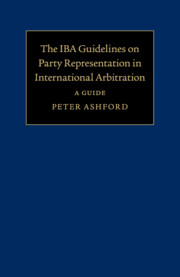Book contents
- Frontmatter
- Contents
- Dedication
- Preface and dedication
- Cases
- About the IBA Arbitration Committee
- The Guidelines
- Definitions
- Guidelines 1–3
- Guidelines 4–6
- Guidelines 7–8
- Guidelines 9–11
- Guidelines 12–17
- Guidelines 18–25
- Guidelines 26–27
- Appendix 1 Extract from the LCIA Arbitration Rules 2014 and Annex to the LCIA Rules
- Appendix 2 Interaction of IBA Rules with major professional conduct rules
- Appendix 3 Interaction of IBA Rules with major institutional rules
- Index
Guidelines 7–8
Published online by Cambridge University Press: 05 July 2016
- Frontmatter
- Contents
- Dedication
- Preface and dedication
- Cases
- About the IBA Arbitration Committee
- The Guidelines
- Definitions
- Guidelines 1–3
- Guidelines 4–6
- Guidelines 7–8
- Guidelines 9–11
- Guidelines 12–17
- Guidelines 18–25
- Guidelines 26–27
- Appendix 1 Extract from the LCIA Arbitration Rules 2014 and Annex to the LCIA Rules
- Appendix 2 Interaction of IBA Rules with major professional conduct rules
- Appendix 3 Interaction of IBA Rules with major institutional rules
- Index
Summary
7. Unless agreed otherwise by the Parties, and subject to the exceptions below, a Party Representative should not engage in any Ex Parte Communications with an Arbitrator concerning the arbitration.
8. It is not improper for a Party Representative to have Ex Parte Communications in the following circumstances:
(a) A Party Representative may communicate with a prospective Party-Nominated Arbitrator to determine his or her expertise, experience, ability, availability, willingness and the existence of potential conflicts of interest.
(b) A Party Representative may communicate with a prospective or appointed Party-Nominated Arbitrator for the purpose of the selection of the Presiding Arbitrator.
(c) A Party Representative may, if the Parties are in agreement that such a communication is permissible, communicate with a prospective Presiding Arbitrator to determine his or her expertise, experience, ability, availability, willingness and the existence of potential conflicts of interest.
(d) While communications with a prospective Party-Nominated Arbitrator or Presiding Arbitrator may include a general description of the dispute, a Party Representative should not seek the views of the prospective Party-Nominated Arbitrator or Presiding Arbitrator on the substance of the dispute.
IBA COMMITTEE COMMENTS
Comments to Guidelines 7–8
Guidelines 7–8 deal with communications between a Party Representative and an Arbitrator or potential Arbitrator concerning the arbitration.
The Guidelines seek to reflect best international practices and, as such, may depart from potentially diverging domestic arbitration practices that are more restrictive or, to the contrary, permit broader Ex Parte Communications.
Ex Parte Communications, as defined in these Guidelines, may occur only in defined circumstances, and a Party Representative should otherwise refrain from any such communication. The Guidelines do not seek to define when the relevant period begins or ends. Any communication that takes place in the context of, or in relation to, the constitution of the Arbitral Tribunal is covered.
Ex Parte Communications with a prospective Arbitrator (Party-Nominated or Presiding Arbitrator) should be limited to providing a general description of the dispute and obtaining information regarding the suitability of the potential Arbitrator, as described in further detail below. A Party Representative should not take the opportunity to seek the prospective Arbitrator's views on the substance of the dispute.
- Type
- Chapter
- Information
- The IBA Guidelines on Party Representation in International ArbitrationA Guide, pp. 41 - 49Publisher: Cambridge University PressPrint publication year: 2016

